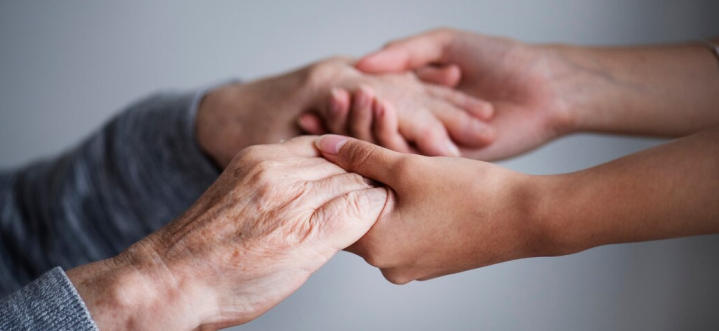
How Does a Personal Alarm Work?
Share
What Does a Personal Alarm Do?
Every year in the UK, over a third of people aged 65 and older experience a fall, and for those over 80, this risk rises to half of all individuals (Centre For Ageing Better). Falls are a leading cause of hospital admissions and loss of independence, and 30% of falls require emergency medical attention (NHS).
For elderly individuals, people with medical conditions, or those recovering from surgery, a personal alarm can mean the difference between rapid assistance and a prolonged emergency. But how do they actually work?
How a Personal Alarm Works
A personal alarm pendant is a lightweight, wearable device designed to provide instant access to help during an emergency. Here’s how it works in simple terms:
-
The Pendant is Triggered – This can happen in two ways:
- Manually: The wearer presses a button on the pendant.
- Automatically: If the pendant detects a fall, it will trigger an alert on its own.
-
Instant Connection to Emergency Assistance – Once triggered, the pendant sends an alert via a built-in mobile SIM or home landline to a 24/7 monitoring centre or a designated emergency contact (family, friends, carers, or neighbours).
-
Immediate Communication – The monitoring team can speak directly to the wearer through the device, assess the situation, and dispatch the appropriate help (ambulance, emergency contacts, or a responder).
-
Emergency Assistance Arrives Quickly – This ensures faster response times compared to calling for help manually, especially if the wearer is unable to reach a phone.
Why Fast Emergency Response Matters
- In the UK, ambulance response times have increased due to NHS pressure. In life-threatening situations, the average wait time is now longer than 8 minutes (NHS England).
- For falls, where someone is left on the floor for over one hour, there’s a 50% chance of serious injury (British Geriatrics Society).
- A personal alarm eliminates delays, ensuring rapid access to medical care, which reduces hospital admissions and improves recovery rates.
Who Needs a Personal Alarm?
Personal alarms are not just for the frail or seriously ill—they provide peace of mind and independence for a wide range of people:
✅ Older adults living alone – Reduces risk and boosts confidence when doing daily activities.
✅ People recovering from surgery – Provides a safety net while mobility is limited.
✅ Individuals with long-term conditions – Supports those with dementia, epilepsy, Parkinson’s, or heart issues.
✅ Active seniors who still enjoy independence – Allows them to stay safe without limiting their lifestyle.
✅ Family members who want peace of mind – Provides constant reassurance that loved ones can get help when needed.
Promoting Independence and Providing Peace of Mind
Personal alarm pendants are not solely for individuals with existing health issues; they also serve as tools to encourage independence and reassure families:
-
For Users: Knowing that help is readily available allows individuals to maintain an active lifestyle with confidence.
-
For Families: Loved ones gain peace of mind, understanding that the wearer has immediate access to assistance, reducing anxiety about potential emergencies.
Why Personal Alarms Are Better Than Mobile Phones
Many assume a mobile phone is enough to call for help. However, personal alarms are designed for emergencies and have several key advantages:
📌 No need to unlock or dial – Just one press (or automatic activation if a fall is detected).
📌 Works even if unconscious or confused – Fall detection ensures an alert is sent.
📌 Always within reach – Worn on the wrist or around the neck, unlike phones, which may be out of reach in an emergency.
📌 Waterproof & shower-safe – Many falls happen in the bathroom, where a mobile cannot be used.
📌 Faster response than calling 999 – Connects directly to trained responders who already have the user's medical details and emergency contacts.
Common Features of Personal Alarms
When choosing a personal alarm pendant, look for:
✔ 24/7 UK-Based Emergency Monitoring – Ensures immediate help, anytime.
✔ Automatic Fall Detection – Alerts responders even if the wearer is unconscious.
✔ GPS Tracking – Helps locate individuals if they are lost or confused.
✔ Waterproof Protection – Wearable in the shower or bath.
✔ No WiFi Needed – Works anywhere with mobile signal, even in rural areas.
✔ Long Battery Life – Ensures continuous protection without frequent charging.
Why Choose Our Personal Alarm?
At Protect Alert, we provide a best-in-class personal alarm pendant that ensures maximum safety, ease of use, and peace of mind.
What Sets Our Pendant Apart?
🔹 Instant 24/7 Emergency Response – UK-based monitoring with trained professionals always ready to assist.
🔹 Advanced Fall Detection – Triggers automatically if a fall is detected, even if the wearer is unconscious.
🔹 GPS Tracking – Ensures rapid location in case of emergency.
🔹 Waterproof Design – Fully functional in bathrooms, showers, and wet conditions.
🔹 Simple, Plug & Play Setup – Works straight out of the box, with no complicated installation.
🔹 No WiFi Required – Works anywhere in the UK using built-in mobile connectivity.
🔹 Affordable Plans – Flexible payment options, ensuring cost-effective safety.
When Is the Right Time to Buy a Personal Alarm?
If you’re wondering whether now is the right time, consider:
🩹 Have you or a loved one recently had a fall?
🏠 Do you live alone or have limited mobility?
💊 Are you recovering from surgery or a hospital stay?
👵 Do family members worry about your safety?
💭 Would you feel more confident knowing help is always available?
If you answered yes to any of these, it’s time to invest in a personal alarm.
Order Your Personal Alarm Today
Ensure safety and independence for yourself or your loved ones.
📞 Call us now: 0800 048 4575
📧 Email us: contact@protectalert.co.uk
Don’t wait until an emergency happens—Protect your tomorrow, today.